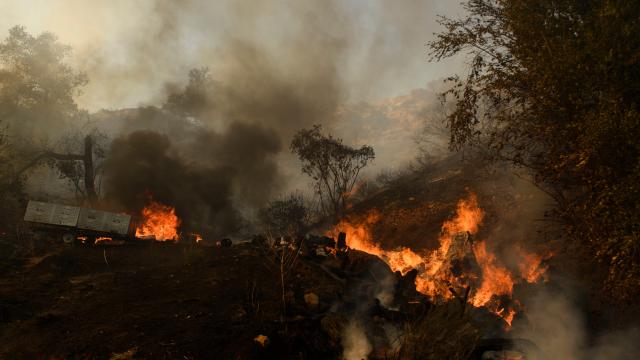A new United Nations report — yeah, another one — warns that the world is on track to exceed the level of global warming laid out in the Paris Agreement. But a green recovery plan to handle the fallout of the covid-19 pandemic could significantly improve our future odds of survival.
Since the beginning of widespread industrial development, the world has warmed by 1.2 degrees Celsius. The Paris Agreement aims to limit warming to 2 degrees Celsius, which would still usher in a pretty catastrophic situation. But the UN Environmental Program’s Emissions Gap Report, released early Wednesday, found that if carbon emission trends continue, the world is headed for a temperature rise in excess of 3 degrees Celsius by the end of this century.
That’s true despite the historic dip in greenhouse gas emissions we’ve seen this year due to the decline in travel, industrial production, and fuel demand amid covid-19 lockdowns. The report says that though carbon emissions are expected to fall this year by up to 7% — the largest yearly drop on record — that will reduce warming in 2050 by just 0.01 degrees Celsius.
A 3 degree increase in the global average temperature would completely upend life on Earth as we know it. For an idea of just how bad it would be, recall that a 2018 UN report found that the impacts of solely heating the planet by 1.5 degrees Celsius, another Paris Agreement-related target, would result in suffering across the planet. Up to 90% of corals would be gone, many low-lying islands would become uninhabitable, extreme weather would become worse, and mass extinction would still be on the table. The new report says we could reach twice that level of warming by 2100.
The mere thought of warming makes me nauseous. But this doesn’t have to be our fate, and the biggest factor is how quickly we act to change course. Right now, governments have an unprecedented opportunity to do so by spending covid-19 stimulus package money wisely.
So far, many governments are bailing out polluters including oil, gas, and coal, and aviation companies in their economic relief measures, and thereby further enshrining the reign of carbon-intensive, deadly industries. But instead, the report says officials should prioritise sustainable measures instead. After all, decarbonising the entire global economy will take a massive amount of investment, and these relief packages could be a part of that.
Among the sectors that governments should fund are renewable energy, transportation, low-carbon buildings, and reforestation. The authors suggest lowering fossil fuel subsidies and banning the construction of new coal plants, which are both remarkably modest demands; other scientists have called for ending all fossil fuel subsidies and phasing out all fossil fuel infrastructure.
Before the covid-19 pandemic began, UN scientists forecasted a 59 gigaton increase in carbon-equivalent greenhouse gases by 2030. But by following their stimulus guidelines, the report shows world leaders could cut up to 25% of that expected pollution. That may not seem like much, but it could make a huge difference: It could give us a 66% chance of keeping temperature increases to below 2 degrees Celsius.
Even these drastic measures, though, wouldn’t necessarily take us off the path of catastrophic warming. The authors also urge governments to promise to phase out of greenhouse gas emissions altogether, and to codify those commitments in their Paris Agreement pledges.
Of course, corporations are responsible for the vast majority of historic greenhouse gas emissions, but the report notes that certain individuals should also get their acts together. It says the combined carbon pollution from the richest 1% of the world’s population is larger than that from the poorest 50%.
“The elite will need to reduce their footprint by a factor of at least 30 to stay in line with the Paris Agreement targets,” the report says.
The discrepancy in carbon pollution exists between richer and poorer countries, too. The U.S., for instance, is responsible for far more historic carbon pollution than any other nation. That gives it and other wealthier countries a particular responsibility to up their climate goals. So far, they’ve largely fallen short.
The UN Commission on Climate Change has asked all Paris Agreement signatories to submit new and improved commitments this year, but the report says not a single member of the G20 — a group of powerful nations which accounts for 85% of the world’s GDP and creates some 78% of all global greenhouse gas pollution — has officially done so. Leaders of those countries should heed these authors’ warnings and stop messing around, because if they don’t, there will be hell to pay.
